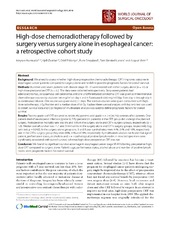| dc.description.abstract | Background We aimed to assess whether high-dose preoperative chemoradiotherapy (CRT) improves outcome in esophageal cancer patients compared to surgery alone and to define possible prognostic factors for overall survival. Methods Hundred-and-seven patients with disease stage IIA - III were treated with either surgery alone (n = 45) or high-dose preoperative CRT (n = 62). The data were collected retrospectively. Sixty-seven patients had adenocarcinomas, 39 squamous cell carcinomas and one undifferentiated carcinoma. CRT was given as three intensive chemotherapy courses by cisplatin 100 mg/m2 on day 1 and 5-fluorouracil 1000 mg/m2/day, from day 1 through day 5 as continuous infusion. One course was given every 21 days. The last two courses were given concurrent with high-dose radiotherapy, 2 Gy/fraction and a median dose of 66 Gy. Kaplan-Meier survival analysis with log rank test was used to obtain survival data and Cox Regression multivariate analysis was used to define prognostic factors for overall survival. Results Toxicity grade 3 of CRT occurred in 30 (48.4%) patients and grade 4 in 24 (38.7%) patients of 62 patients. One patient died of neutropenic infection (grade 5). Fifty percent (31 patients) in the CRT group did undergo the planned surgery. Postoperative mortality rate was 9% and 10% in the surgery alone and CRT+ surgery groups, respectively (p = 1.0). Median overall survival was 11.1 and 31.4 months in the surgery alone and CRT+ surgery groups, respectively (log rank test, p = 0.042). In the surgery alone group one, 3 and 5 year survival rates were 44%, 24% and 16%, respectively and in the CRT+ surgery group they were 68%, 44% and 29%, respectively. By multivariate analysis we found that age of patient, performance status, alcoholism and > = 4 pathological positive lymph nodes in resected specimen were significantly associated with overall survival, whereas high-dose preoperative CRT was not. Conclusion We found no significant survival advantage in esophageal cancer stage IIA-III following preoperative high-dose CRT compared to surgery alone. Patient's age, performance status, alcohol abuse and number of positive lymph nodes were prognostic factors for overall survival | en_US |

